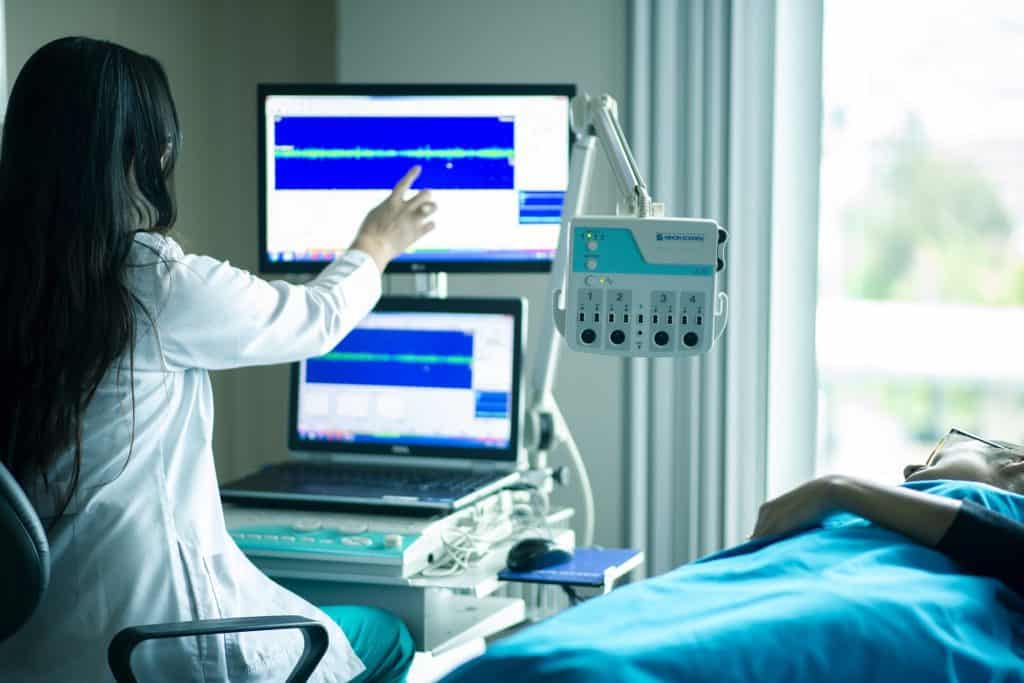What is Biofeedback Therapy? Biofeedback Therapy for Anxiety & Biofeedback Therapy Near Me
Biofeedback is a technique used to improve the ability to modify involuntary processes consciously. It is frequently used for symptom management in chronic illness and as part of physical therapy for patients with motor dysfunction. Biofeedback also has non-musculoskeletal targets such as anxiety and stress reduction. It is frequently used to manage stress and anxiety, either if they are the primary illness or due to another cause. Continue to read more about the benefits and side effects of biofeedback therapy for mental health.
By We Level Up | Editor Yamilla Francese | Clinically Reviewed By Lauren Barry, LMFT, MCAP, QS, Director of Quality Assurance | Editorial Policy | Research Policy | Last Updated: July 3, 2023
What is Biofeedback Therapy?
We Level Up Treatment Centers offer Biofeedback Therapy at select locations. Biofeedback for mental health is a therapeutic approach that utilizes technology to provide individuals with real-time feedback on their physiological responses related to mental states. Individuals can gain awareness and control over their mental and emotional states by measuring heart rate variability, skin conductance, or brainwave activity. The feedback allows individuals to learn self-regulation techniques and make conscious changes to improve their mental well-being. Call to learn about the We Level Up Biofeedback Therapy program availability. Biofeedback Therapy facilities and treatment are subject to change.
Biofeedback has been studied for various mental health conditions, including the following:
- Anxiety disorders.
- Depression.
- Attention deficit hyperactivity disorder (ADHD).
- Post-traumatic stress disorder (PTSD).
Scientific research suggests that biofeedback can reduce symptoms and improve mental health outcomes. However, individual response and efficacy may vary, and biofeedback is often used as part of a comprehensive recovery plan that may include other therapies and interventions.
Types of Neuro Biofeedback Therapy
Neuro biofeedback therapy, also known as neurofeedback or EEG biofeedback therapy, is a therapeutic technique that utilizes real-time feedback of brainwave activity to train individuals to self-regulate their brain function.
It involves placing sensors on the scalp to measure electrical brain activity, precisely the different frequencies of brainwaves such as alpha, beta, theta, and delta waves. Individuals receive immediate feedback about their brainwave patterns through visual or auditory cues and learn to modify them consciously.
The goal is to encourage desirable brainwave patterns associated with relaxation, focus, or cognitive functioning while reducing patterns related to stress, anxiety, or attention difficulties. Neuro biofeedback therapy has been used to address various conditions, including ADHD, anxiety disorders, depression, insomnia, and cognitive impairments. It aims to enhance self-awareness, promote self-regulation, and improve overall brain function and mental well-being.
Several types of neuro biofeedback therapy techniques are commonly used:
- Electroencephalography (EEG) Neurofeedback: This technique uses scalp sensors to measure the brain’s electrical activity. It focuses on training individuals to self-regulate their brainwave patterns, such as increasing alpha waves associated with relaxation or decreasing beta waves associated with stress and anxiety.
- Heart Rate Variability (HRV) Biofeedback: HRV biofeedback involves monitoring and training individuals to regulate their heart rate variability, which is the variation in time intervals between heartbeats. This technique can promote relaxation and reduce stress by increasing heart rate coherence and balancing the autonomic nervous system.
- Galvanic Skin Response (GSR) Biofeedback: GSR biofeedback measures alterations in the electrical conductance of the skin, which can reflect arousal levels and emotional responses. It helps individuals recognize their stress levels and learn techniques to regulate their physiological reactions.
- Respiratory Biofeedback: This technique focuses on training individuals to control their breathing patterns, such as slowing down the breath rate or practicing diaphragmatic breathing. It can help reduce anxiety, increase relaxation, and improve physiological and emotional well-being.
- Temperature Biofeedback: Temperature biofeedback involves monitoring and training individuals to regulate their peripheral temperature, typically in the hands or fingers. It can help promote relaxation and improve blood flow to reduce symptoms associated with stress, anxiety, and migraines.
These are just a few examples of neuro biofeedback therapy techniques, and different therapists may use a combination of these or other approaches based on individual needs and goals.
How Does Biofeedback Therapy Works?
Electrical sensors connecting to a monitor will be hooked to your body. The sensors measure one or more signs of stress. For example, the sensor can include heart rate, muscle tension, or body temperature. The measurements provide feedback about how your body responds to different stimuli.

Skip To:
Learn More:
- What Is EMDR Therapy & How Effective Is It?
- What Is Dialectical Behavior Therapy (DBT)?
- What Is Cognitive Behavioral Therapy (CBT)?
- Brain Painting Neurofeedback Biofeedback Therapy. Brain Paint for Mental Health & Addiction Treatment.
- Neurofeedback Therapy for Depression
- Benefits of Solution-Focused Therapy
- Telemedicine Therapy, Services, & Benefits
- Dialectical Behavior Therapy vs Cognitive Behavioral Therapy
- Hyperbaric Oxygen Therapy for Depression
- Intervention Services For Addiction & Mental Health Recovery
A biofeedback therapist can teach you how to lower your heart rate through breathing exercises, relaxation techniques, and mental exercises. Then, you can measure the results of these techniques and activities on the monitor. This encourages more positive reactions and relaxation.
A typical biofeedback session lasts between 30 and 60 minutes. However, the number of sessions needed to resolve an issue will vary based on factors, including how quickly you learn to control your physical responses.
There are also commercial biofeedback therapy machines available on the open market that are meant for home use. There are devices with handheld monitors and others that connect to your computer. However, it would help if you were careful of scams. Check with your primary care provider before purchasing one of these devices. Not all manufacturers are reputable.
Biofeedback Therapy Fact Sheet
What Biofeedback Therapy Can Help With?
It is beneficial for managing stress as well as a variety of conditions that may be exacerbated by stress, including attention-deficit/hyperactivity disorder (ADHD) and the following:
- Anxiety.
- Traumatic brain injuries.
- Depression.
- Digestive disorders such as irritable bowel syndrome (IBS).
- High and low blood pressure.
- Migraines.
- Pain.
- Physical reactions to stress.
- Post-traumatic stress disorder (PTSD).
- Relaxation and stress management.
- Tension headaches.
- Other Mental health conditions.
Benefits of Biofeedback Therapy
Like other treatment approaches, biofeedback has its upsides and downsides. It may not be suitable for everyone, so it is essential to consider the benefits and risks before determining if it is the best choice for your situation. What are some of the reasons why you might consider using biofeedback therapy?
- It’s Non-Invasive: Biofeedback therapy may appeal when other ineffective treatments or people cannot take certain medications. Although biofeedback therapy is non-invasive, patients may prefer it when other treatments may be more invasive or disrupting.
- It Can Complement Other Treatments: Biofeedback training can also be used as one part of a treatment approach. In addition, people often use biofeedback to augment other treatments, including medication and relaxation strategies.
- It Can Help Put You in Control of Your Emotions: Biofeedback also teaches people how to control their responses in stressful situations, which can help people feel more in control and better manage the stress they may face daily and the pressure resulting from another health condition.
It can also have additional mental health benefits, including learning new techniques for coping with anxiety and managing emotional responses.
Things to Consider Before Trying Biofeedback Therapy
Biofeedback is generally considered a safe procedure, but you should always talk to your physician or therapist about your options before you begin. It is only sometimes suitable for everyone; other approaches might work better for your situation.
- Credentials: Be sure to check on the credentials of the professional treating you.
- Cost: Fees vary based on the biofeedback therapist’s training, qualification, and experience.
- Biofeedback Therapy Devices: Medical and mental health professionals use the first one. The second one is available on the consumer market for personal use. Remember that most of the devices you see available for purchase have yet to be evaluated for safety or effectiveness by the Food and Drug Administration (FDA). Talk to your therapist about which devices they recommend.
Two Different Categories of Biofeedback Therapy Devices
- Clinical Biofeedback Therapy Devices: The FDA regulates these devices utilized for clinical purposes. These devices are often available through a biofeedback therapist’s office or the office of another health practitioner.
- Personal Use Biofeedback Devices: This device can be purchased from online retailers for personal, in-home use. Such devices often involve sensors that record information and can be plugged into a computer. Other wearable devices utilize sensors that provide input via an app on your mobile device.
Preparing For Biofeedback Therapy
Check your biofeedback therapist’s credentials before starting therapy. It would help if you asked about their training and whether or not they accept your health insurance. State laws regulating biofeedback practitioners vary. Check your own state’s regulations before visiting a therapist.
Biofeedback is generally safe but might not be appropriate for everyone. For example, biofeedback devices might not work correctly on people with certain medical conditions, such as heart rhythm problems or skin conditions. So be sure to discuss it with your doctor first.

Get Your Life Back
Find Hope & Recovery. Get Safe Comfortable Detox, Addiction Rehab & Dual Diagnosis High-Quality Care.
Hotline(844) 597-1011Biofeedback Therapy Mental Health-Related Statistics
The most common types of therapies utilized in mental health treatment in the US include cognitive-behavioral therapy (CBT), psychodynamic therapy, biofeedback therapy, and medication management. However, the choice of therapy depends on the individual’s needs, diagnosis, and treatment preferences. Unfortunately, there are disparities in access to mental health care, with specific populations facing barriers such as lack of insurance coverage or limited availability of services in their communities.
19%
In 2019, about 19% of adults received mental health treatment in the past year.
Source: SAMHSA
20%
Roughly 20% of adults in the United States experience a mental health disorder in any given year.
Source: NIMH
20.1 Million
In 2019, approximately 20.1 million US adults (8.2% of the adult population) took psychiatric medications.
Source: NIMH
Understanding Biofeedback Therapy for Anxiety
There are numerous effective therapy options for mental health, and biofeedback therapy is recognized as one, particularly for anxiety. Biofeedback therapy can be a valuable tool in the treatment of anxiety disorders because it helps individuals develop self-regulation skills and gain control over their physiological responses.
Biofeedback therapy for anxiety is a non-invasive treatment approach to help individuals learn self-regulation techniques to manage their anxiety symptoms.
It involves using sensors to monitor anxiety-related physiological responses, such as heart rate, skin conductance, or muscle tension. This information is then provided to the individual in real-time visual or auditory feedback, allowing them to become aware of their body’s reactions and learn to regulate them consciously.
By practicing biofeedback techniques, individuals can potentially reduce anxiety, promote relaxation, and improve their overall well-being. Research has shown promising results in using biofeedback therapy as a complementary treatment for anxiety disorders. Still, it is often used in conjunction with other therapeutic interventions for a comprehensive approach to anxiety management.
Biofeedback Physical Therapy
Biofeedback physical therapy often incorporates relaxation exercises and strategies, such as progressive muscle relaxation, deep breathing, and guided imagery. These practices can help individuals develop a stronger mind-body connection, promoting relaxation and reducing anxiety or depressive symptoms.
- Belly breathing biofeedback therapy involves diaphragmatic breathing, focusing on deep, slow breaths that expand the belly rather than shallow chest breathing. This biofeedback therapy can enhance the practice of belly breathing by providing real-time feedback on breathing patterns and helping individuals learn to achieve optimal diaphragmatic breathing.
- Ultrasound biofeedback speech therapy also can be a beneficial tool in speech therapy. Ultrasound biofeedback is used in speech therapy to provide visual feedback on tongue movement and placement during speech production. It involves using ultrasound imaging technology to capture real-time images of the tongue and its movements.
- Biofeedback occupational therapy may support individuals in improving self-regulation, managing stress, and enhancing overall well-being. Sensors are placed on the individual’s body to measure physiological reactions, such as heart rate, skin conductance, or muscle tension. These sensors provide real-time data that is then fed into the biofeedback equipment.
- Biofeedback therapy for constipation can be an option for individuals experiencing chronic constipation. It focuses on improving the coordination and function of the pelvic floor muscles, which play a role in bowel movements. Biofeedback therapy constipation treatment is often used in conjunction with other treatment approaches, such as dietary modifications, fluid intake adjustments, and medication, to address constipation comprehensively.
Physical therapy biofeedback alone may not be sufficient for treating complex mental health conditions. It is typically used as part of a comprehensive treatment approach that involves collaboration between physical therapists, mental health professionals, and other healthcare providers to address the holistic needs of individuals with mental health symptoms.
Biofeedback Therapy Pelvic Floor
Biofeedback therapy for pelvic floor can have indirect benefits for mental health. The pelvic floor refers to a group of muscles at the bottom of the pelvis that plays a role in bladder and bowel control, sexual function, and support of pelvic organs. When these muscles are tense, weak, or dysfunctional, it can contribute to physical discomfort and emotional distress.
Biofeedback pelvic floor therapy involves sensors to monitor muscle activity in the pelvic floor region. This feedback helps individuals become aware of their pelvic floor muscle tension and learn to control and relax these muscles more effectively.
While pelvic floor biofeedback therapy can indirectly benefit mental health, it is typically used as part of a comprehensive treatment approach that may include other interventions such as pelvic floor exercises, lifestyle modifications, and psychological support. Consulting with a qualified healthcare provider or biofeedback therapy specialist can help determine the most appropriate treatment plan for your needs.

Get Help. Get Better. Get Your Life Back.
Searching for Accredited Drug and Alcohol Rehab Centers Near You?
Even if you have failed previously and relapsed, or are in the middle of a difficult crisis, we stand ready to support you. Our trusted behavioral health specialists will not give up on you. When you feel ready or just want someone to speak to about therapy alternatives to change your life call us. Even if we cannot assist you, we will lead you to wherever you can get support. There is no obligation. Call our hotline today.
(844) 597-1011What Happens During a Biofeedback Therapy Session?
The number of biofeedback therapy sessions required varies depending on the individual’s needs and progress. Biofeedback therapy is often part of a comprehensive treatment plan, which may include other therapeutic interventions and techniques tailored to the individual’s mental health condition.
During a biofeedback therapy session, several steps typically take place:
- Assessment: The therapist begins by assessing the individual’s specific needs, concerns, and goals related to their mental health. They may also gather information about the individual’s medical history and conditions.
- Sensor Placement: The therapist attaches sensors to the individual’s body to measure physiological responses. Standard sensor placements include the scalp for monitoring brainwaves (EEG), the fingers or hands for measuring skin conductance or temperature, and the chest for monitoring heart rate.
- Feedback Display: The sensors collect real-time data, which is then translated into visual or auditory feedback. The therapist uses specialized equipment to display this feedback to the individual, allowing them to observe their physiological responses in real-time.
- Education and Training: The therapist guides the individual in understanding the meaning of the feedback and how it relates to their mental state. They explain the target physiological responses associated with relaxation or improved mental well-being.
- Practice and Self-Regulation: The individual uses exercises and techniques to modify physiological responses based on consciously receiving feedback. This may involve relaxation techniques, controlled breathing, visualization, or other strategies tailored to the individual’s needs.
- Progress Monitoring: The therapist monitors the individual’s progress throughout the session and provides guidance and support as needed. They may adjust the feedback parameters or offer additional strategies to enhance the individual’s self-regulation skills.
- Homework and Follow-up: The therapist may assign exercises or techniques for the individual to practice between sessions. Follow-up sessions are scheduled to assess progress, address concerns, and modify the therapy plan.
What are the Side Effects of Biofeedback Therapy?
Side effects are rare, and the benefits of biofeedback therapy often outweigh any potential drawbacks. Therapists are trained to closely monitor individuals during sessions and address any concerns or discomfort that may arise.
Biofeedback therapy is generally considered safe and non-invasive, with minimal side effects. However, there are a few potential considerations to be aware of:
- Mild Discomfort: Some individuals may experience minor discomfort during the session due to the attachment of sensors or electrodes to the skin. This discomfort is usually temporary and subsides after the session.
- Fatigue or Mental Exhaustion: Biofeedback therapy requires mental effort and focus. Some individuals may feel mentally exhausted after a session, especially when working on complex self-regulation techniques. However, this is typically temporary and improves with rest.
- Emotional Responses: Biofeedback therapy can sometimes evoke emotional responses as individuals become aware of the physiological patterns associated with their mental health. This increased awareness may lead to temporary emotional discomfort. Therapists must provide support and address any emotional reactions during the therapy process.
- Overreliance on Biofeedback: In some cases, individuals may develop a dependency on biofeedback equipment and struggle to generalize self-regulation techniques to real-life situations. Therapists must help clients transition from relying solely on biofeedback to independently implementing self-regulation strategies daily.
First-class Facilities & Amenities
World-class High-Quality Addiction & Mental Health Rehabilitation Treatment
Rehab Centers TourRenowned Addiction Centers. Serene Private Facilities. Inpatient rehab programs vary.
Addiction Helpline(844) 597-1011Proven recovery success experience, backed by a Team w/ History of:
15+
Years of Unified Experience
100s
5-Star Reviews Across Our Centers
10K
Recovery Success Stories Across Our Network
- Low Patient to Therapist Ratio
- Onsite Medical Detox Center
- Comprehensive Dual-Diagnosis Treatment
- Complimentary Family & Alumni Programs
- Coaching, Recovery & Personal Development Events
How To Find a Qualified Biofeedback Therapy Near Me?
To find a qualified biofeedback therapy specialist, you can follow these steps:
- Seek Referrals: Ask your primary care physician or mental health provider for recommendations. They may be familiar with reputable biofeedback therapists in your area or can provide referrals to trusted sources.
- Check Professional Organizations: Look for professional members of reputable organizations such as the Biofeedback Certification International Alliance (BCIA) or the Association for Applied Psychophysiology and Biofeedback (AAPB). These organizations maintain directories of certified practitioners who have met rigorous standards in biofeedback therapy.
- Conduct Online Research: Search online for biofeedback therapists in your area. Read their websites or professional profiles to gather information about their qualifications, experience, and specialties. Pay attention to their credentials, certifications, and specific areas of expertise related to your needs.
- Verify Licensure and Credentials: Ensure the biofeedback therapist holds appropriate licenses and certifications in their field. This may include being a licensed psychologist, mental health counselor, or certified biofeedback practitioner. You can usually verify licensure by checking with your state licensing board or the respective professional organization.
- Consider Experience and Specialization: Look for a therapist who has experience working with the specific condition or symptoms you are seeking treatment for, such as anxiety, migraines, or chronic pain. Specialized training or certifications in particular areas of biofeedback therapy can also be beneficial.
- Consultation and Compatibility: Contact potential biofeedback therapists and schedule an initial consultation. Use this opportunity to discuss your concerns, ask questions about their approach and experience, and gauge their compatibility with your personality and treatment goals. A good therapeutic relationship is crucial for the success of the therapy.
- Cost and Insurance: Inquire about the cost of sessions and whether the therapist accepts your insurance, if applicable. All insurance plans may not cover biofeedback therapy, so it’s essential to understand the financial aspects beforehand.
By following these steps, you can select a qualified biofeedback therapy specialist who is well-suited to address your needs and provide effective treatment. Connect with We Level Up mental health treatment center for more information and resources.

We Level Up Fort Lauderdale
Premier Behavioral Health Treatment Center
Licensed & Accredited w/ 5-star reviews.- Inpatient mental health treatment center
- Therapy for depression, anxiety, trauma, bipolar disorder, PTSD, and more.
- Dual diagnosis rehab programs available

West Palm Beach (coming soon)
Premier Behavioral Health Treatment Center
Coming soon (licensed & accredited.)- Inpatient mental health treatment center
- Therapy for depression, anxiety, trauma, bipolar disorder, PTSD, and more.
- Dual diagnosis rehab programs available

We Level Up Washington
Premier Behavioral Health Treatment Center
Licensed & Accredited w/ 5-star reviews.- Inpatient mental health treatment center
- Therapy for depression, anxiety, trauma, bipolar disorder, PTSD, and more.
- Dual diagnosis rehab programs available
World-class, Accredited, 5-Star Reviewed, Effective Addiction & Mental Health Programs. Complete Behavioral Health Inpatient Rehab, Detox plus Co-occuring Disorders Therapy.
CALL(844) 597-1011End the Addiction Pain. End the Emotional Rollercoaster. Get Your Life Back. Start Drug, Alcohol & Dual Diagnosis Mental Health Treatment Now. Get Free No-obligation Guidance by Substance Abuse Specialists Who Understand Addiction & Mental Health Recovery & Know How to Help.
Top 3 Biofeedback Therapy Exercises FAQs
-
How much is the biofeedback therapy cost?
The cost of biofeedback therapy is determined by various factors such as the location, the qualifications and experience of the therapist, and the number of sessions required. A single biofeedback therapy session can range from $75 to $200 on average. Some therapists may offer package deals or discounted rates for multiple sessions.
-
How effective is biofeedback therapy?
Biofeedback therapy has shown promising effectiveness in various areas, including stress management, anxiety, pain management, and certain medical conditions. Research studies have demonstrated positive outcomes in reducing symptoms and improving overall well-being in individuals who undergo biofeedback therapy. However, individual results may vary, and the effectiveness of biofeedback therapy can depend on factors such as the individual’s commitment, the specific condition being treated, and the skill and expertise of the therapist.
-
Does insurance cover biofeedback therapy?
Insurance coverage for biofeedback therapy can vary based on the insurance provider and the specific policy. Some insurance plans may offer coverage for biofeedback therapy as part of mental health or complementary and alternative medicine benefits. However, it is crucial to check with your insurance provider to determine if biofeedback therapy is covered and to understand any limitations or requirements, such as pre-authorization or a referral from a healthcare provider.
Learn About Anxiety Disorder Facts & Anxiety Treatment Programs That Can Help You
Neurofeedback therapy is a non-invasive approach that aims to alleviate anxiety symptoms by training individuals to self-regulate their brain activity. It involves using sensors to monitor the brainwaves and providing real-time feedback to the individual.
Through repeated sessions, patients learn to recognize and modify patterns associated with anxiety, promoting a state of calm and relaxation. Neurofeedback therapy has shown promising results in reducing anxiety levels and improving overall well-being in individuals seeking alternative treatment options.
Get FREE mental health treatment insurance check – https://welevelup.com/rehab-insurance/
If you or a loved one is struggling with mental health problems or other substance use disorder(s), call for a FREE consultation 24/7 at (561) 678-0917
Learn About Anxiety Disorder Facts Video Transcript
Anxiety disorders are a prevalent mental health condition. According to the National Institute of Mental Health, 31.1% of Americans have suffered from some anxiety disorder.
Everyone experiences anxiety because it is one of the body’s natural responses to stress, but people with anxiety disorders frequently have intense, excessive, and persistent worries about everyday situations.
These feelings of anxiety and panic interfere with daily activities and are difficult to control. They are also out of proportion to the actual degree of danger and last long after exposure to the trigger. In many cases, these symptoms lead people to avoid situations or people that might trigger anxiety. Symptoms may start during childhood or the teen years and continue into adulthood.
Anxiety activates the stress response, also known as the fight, flight, or freeze response. This survival reaction immediately stimulates the body into emergency action, putting stress on the body.
Experience Transformative Recovery at We Level Up Treatment Centers.
See our authentic success stories. Get inspired. Get the help you deserve.
Start a New Life
Begin with a free call to an addiction & behavioral health treatment advisor. Learn more about our dual-diagnosis programs. The We Level Up Treatment Center Network delivers recovery programs that vary by each treatment facility. Call to learn more.
- Personalized Care
- Caring Accountable Staff
- World-class Amenities
- Licensed & Accredited
- Renowned w/ 100s 5-Star Reviews
We’ll Call You
Search We Level Up Biofeedback Therapy, Mental Health Topics & Resources
Sources
[1] Marzbani H, Marateb HR, Mansourian M. Neurofeedback: A Comprehensive Review on System Design, Methodology and Clinical Applications. Basic Clin Neurosci. 2016 Apr;7(2):143-58. doi 10.15412/J.BCN.03070208. PMID: 27303609; PMCID: PMC4892319.
[2] Neurofeedback and Biofeedback for Mood and Anxiety Disorders: A Review of the Clinical Evidence and Guidelines – An Update [Internet]. Ottawa (ON): Canadian Agency for Drugs and Technologies in Health; 2014 Aug 26. SUMMARY OF EVIDENCE. Available from: https://www.ncbi.nlm.nih.gov/books/NBK253825/
[3] Guidance on Supported Biofeedback/Neurofeedback Modalities for VA Facilities – Veterans Affairs (.gov)
[4] Biofeedback – Whole Health Available from: https://www.va.gov/WHOLEHEALTH/professional-resources/Biofeedback.asp
[5] NCD – Biofeedback Therapy (30.1) Available from: https://www.cms.gov/medicare-coverage-database/view/ncd.aspx?NCDId=41
[6] Neurofeedback Training for People With Aphasia – https://www.alzheimers.gov/clinical-trials/neurofeedback-training-people-aphasia
[7] Developments in Neurofeedback: Should Health Educators Be Paying Attention? – Department of Education (.gov)
[8] Biofeedback: MedlinePlus Medical Encyclopedia Available from: https://medlineplus.gov/ency/article/002241.htm
[9] Banerjee S, Argáez C. Neurofeedback and Biofeedback for Mood and Anxiety Disorders: A Review of Clinical Effectiveness and Guidelines [Internet]. Ottawa (ON): Canadian Agency for Drugs and Technologies in Health; 2017 Nov 13. Available from: https://www.ncbi.nlm.nih.gov/books/NBK531603/
[10] Chen C, Xiao X, Belkacem AN, Lu L, Wang X, Yi W, Li P, Wang C, Sha S, Zhao X, Ming D. Efficacy Evaluation of Neurofeedback-Based Anxiety Relief. Front Neurosci. 2021 Oct 28;15:758068. doi 10.3389/fnins.2021.758068. PMID: 34776855; PMCID: PMC8581142.



